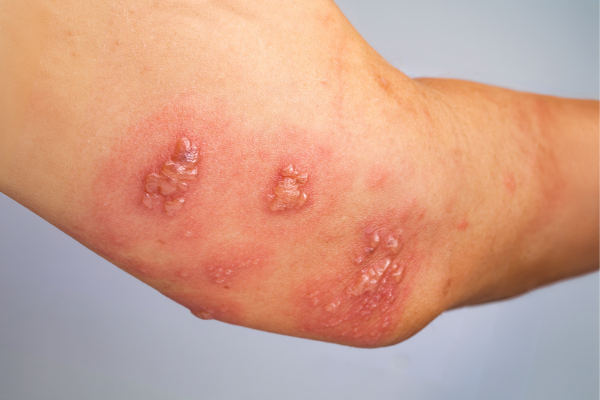Reactive arthritis, gut health and collagen

The connection between reactive arthritis, gut health, and collagen
Reactive arthritis is a form of inflammatory joint pain that usually occurs in response to an infection in the body. This means that the immune system attacks the joints, most often in the knees, feet and ankles, after an infection, often in the urinary tract or intestines, has occurred. The exact mechanisms behind reactive arthritis are still not fully understood, but there is a growing understanding of how gut health, the immune system and collagen may play an important role in the development and course of the disease.
The gut microbiome – the collection of bacteria and microorganisms that live in the intestines – is crucial for keeping the immune system in balance. When the microbiome is disrupted or an infection occurs, the immune system can overreact, potentially leading to the development of autoimmune diseases such as reactive arthritis. Collagen, which is one of the most abundant proteins in connective tissue, also plays an important role in understanding reactive arthritis, especially in relation to gut health and inflammation.
This article will explore the connection between reactive arthritis, gut health, and collagen, and provide detailed insight into how these factors interact to influence the disease's mechanisms, symptoms, and treatment.
1. What is Reactive Arthritis?
Reactive arthritis is a form of arthritis that most often develops after an infection in the body. The disease is usually preceded by a bacterial infection in the urinary tract or intestines. The disease is called "reactive" because it develops in response to the infection, even though it is not directly caused by the bacteria itself. This means that the infection triggers an overreaction in the immune system, which then attacks the joints.
The most common symptoms of reactive arthritis are pain, swelling and stiffness in the joints, most commonly in the knees, ankles and feet. In some cases, it can also affect the eyes (conjunctivitis) and urinary tract, which is why the disease is sometimes called the "triad" – arthritis, conjunctivitis and urinary tract infection.
Reactive arthritis most often occurs after infections with specific bacteria, such as Chlamydia trachomatis , Salmonella , Shigella , and Campylobacter . These infections cause the bacteria or their toxins to enter the intestines, triggering an immunological response that results in inflammation of the joints.
2. The Connection Between Gut Health and Reactive Arthritis
Gut health is a central factor in the development and course of reactive arthritis. An important aspect of this connection is the microbiome – the collection of microorganisms that live in our gut. The microbiome plays a key role in the immune system and helps regulate the body’s inflammatory response. When the microbiome is disrupted, it can lead to an imbalance in the immune system, which can result in inflammatory conditions such as reactive arthritis.
The Microbiome and the Immune System
Research has shown a link between a disturbed gut microbiome and inflammatory diseases, including reactive arthritis. When the microbiome is out of balance – a condition called dysbiosis – the immune system can overreact, leading it to attack the body’s own tissues, including the joints. There is also a theory that the microbiome may directly influence the development of reactive arthritis by influencing the immune system’s response to infections.
Studies have also shown that gut bacteria can induce an immunological response that affects joints, especially after an infection. For example, bacteria that cause intestinal infections (such as Salmonella and Campylobacter ) can trigger an inflammatory reaction in the joints by producing proteins that resemble the body's own tissues. This leads to the immune system mistakenly attacking the joints - a phenomenon called molecular mimicry.
Leaky Gut and Systemic Inflammation
Leaky gut is a condition in which the intestinal barrier becomes permeable, allowing harmful substances to leak into the bloodstream. This can lead to systemic inflammation and activation of the immune system, which is a major factor in the development of many autoimmune diseases, including reactive arthritis.
In reactive arthritis, researchers have found that patients often suffer from leaky gut, which can contribute to an exaggerated immune response. Harmful substances leaking from the gut can cause inflammation not only in the gut but also in the joints, worsening the disease.
3. Collagen and Reactive Arthritis
Collagen is the most abundant protein in connective tissue and plays a central role in both gut and joint function. It provides structure and stability to tissues and helps maintain the gut barrier function and joint mobility. In reactive arthritis, collagen may be a key factor in how the disease develops and affects the body.
Collagen in the Intestines
Collagen is found in the walls of the intestine and is an important component in keeping the intestine intact and functional. When inflammation occurs in the intestine – for example, during a bacterial infection – collagen production can be affected. This can lead to a deterioration of the intestinal barrier function, which allows harmful substances to leak out and cause systemic inflammation.
Collagen is also involved in the healing process in the gut. If collagen production is elevated as a result of inflammation, this can lead to fibrosis (scarring) in the gut. This fibrosis can impair gut function and make the gut barrier more permeable, further exacerbating the inflammatory process.
Collagen in the Joints
Reactive arthritis is a form of joint inflammation, and collagen plays an important role in the structure and function of joints. Joints are surrounded by a capsule of connective tissue that contains collagen. When the immune system attacks the joints during an episode of reactive arthritis, the collagen in the joints can be broken down, leading to inflammation and pain. This can make the joints more vulnerable to further damage and increase pain levels during disease activity.
Chronic inflammation and repeated breakdown of collagen can also lead to changes in the structure of the joint, such as stiffness and reduced mobility. This can contribute to long-term symptoms and functional impairments for people suffering from reactive arthritis.
Collagen and Immune Response
Collagen also has a direct connection to immune system activity. When collagen is broken down or damaged, the body's immune system can respond and try to repair the damage. However, in some cases, the immune system can mistakenly begin to attack collagen as if it were a foreign substance, leading to an autoimmune reaction. This process is central to the development of many autoimmune diseases, including reactive arthritis.
Collagen-related problems can therefore both contribute to the development of the disease and worsen its symptoms, an important mechanism that must be considered in the treatment of reactive arthritis.
4. Treatment and Management of Reactive Arthritis
Treatment for reactive arthritis focuses on reducing inflammation, relieving pain, and preventing long-term joint damage. To effectively manage the disease, it is important to address both gut health and collagen-related factors.
Treatment of Intestinal Health
Because gut health plays a central role in the development and course of reactive arthritis, it is important to improve the microbiome and strengthen the gut barrier. Dietary changes can help relieve symptoms and reduce inflammation. A diet rich in anti-inflammatory foods such as fruits, vegetables, and fatty fish, as well as probiotic foods such as yogurt and kefir, can help balance the gut flora and support the immune system.
Prebiotics, found in foods like onions, garlic, and bananas, can also help support the growth of good bacteria in the gut. Research suggests that this type of diet may help reduce inflammation and improve both gut and joint health in reactive arthritis.
Treatment of Collagen-Related Effects
To address the collagen-related effects of reactive arthritis, such as collagen breakdown in the joints and gut, collagen peptides or collagen supplements may be helpful. These supplements can support collagen production in both the gut and joints and help strengthen connective tissue and reduce tissue damage.
In severe cases of joint inflammation, medications such as NSAIDs (nonsteroidal anti-inflammatory drugs) or disease-modifying anti-rheumatic drugs (DMARDs) may be necessary to control inflammation and reduce pain and swelling in the joints.
Conclusion
The relationship between reactive arthritis, gut health, and collagen is complex and involves multiple factors that interact to influence the onset and progression of the disease. Disturbances in the gut microbiome and impaired gut barrier function can lead to an overactive immune response, which can trigger joint inflammation and worsen the symptoms of reactive arthritis. Collagen plays a central role in both gut structure and joint function, and collagen breakdown can lead to long-term damage and pain. By understanding these connections and implementing appropriate treatment strategies, we can help patients manage their disease and improve their quality of life.






